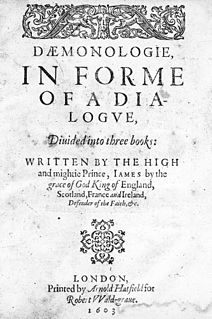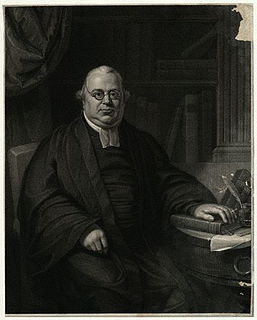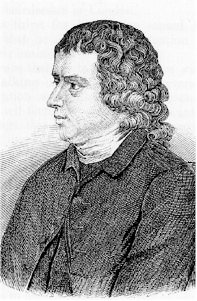
Satan, also known as the Devil, is an entity in the Abrahamic religions that seduces humans into sin or falsehood. In Christianity and Islam, he is usually seen as either a fallen angel or a jinn, who used to possess great piety and beauty, but rebelled against God, who nevertheless allows him temporary power over the fallen world and a host of demons. In Judaism, Satan is typically regarded as a metaphor for the yetzer hara, or "evil inclination", or as an agent subservient to God.

Biblical inerrancy is the belief that the Bible "is without error or fault in all its teaching"; or, at least, that "Scripture in the original manuscripts does not affirm anything that is contrary to fact". Some equate inerrancy with biblical infallibility; others do not. The belief is of particular significance within parts of evangelicalism, where it is formulated in the "Chicago Statement on Biblical Inerrancy".

Daemonologie—in full Daemonologie, In Forme of a Dialogue, Divided into three Books: By the High and Mighty Prince, James &c.—was written and published in 1597 by King James VI of Scotland as a philosophical dissertation on contemporary necromancy and the historical relationships between the various methods of divination used from ancient black magic. This included a study on demonology and the methods demons used to bother troubled men. It also touches on topics such as werewolves and vampires. It was a political yet theological statement to educate a misinformed populace on the history, practices and implications of sorcery and the reasons for persecuting a person in a Christian society accused of being a witch under the rule of canonical law. This book is believed to be one of the main sources used by William Shakespeare in the production of Macbeth. Shakespeare attributed many quotes and rituals found within the book directly to the Weird Sisters, yet also attributed the Scottish themes and settings referenced from the trials in which King James was involved.

Jacob Bryant (1715–1804) was an English scholar and mythographer, who has been described as "the outstanding figure among the mythagogues who flourished in the late eighteenth and early nineteenth centuries."
The Racovian Catechism is a nontrinitarian statement of faith from the 16th century. The title Racovian comes from the publishers, the Polish Brethren, who had founded a sizeable town in Raków, Kielce County, where the Racovian Academy and printing press was founded by Jakub Sienieński in 1602.

Thomas Belsham was an English Unitarian minister

The temptation of Christ is a biblical narrative detailed in the Gospels of Matthew, Mark and Luke. After being baptized by John the Baptist, Jesus fasted for 40 days and nights in the Judaean Desert. During this time, Satan appeared to Jesus and tried to tempt him. Jesus having refused each temptation, Satan then departed and Jesus returned to Galilee to begin his ministry.

Theophilus Lindsey was an English theologian and clergyman who founded the first avowedly Unitarian congregation in the country, at Essex Street Chapel.

In mainstream Christianity, the devil is a fallen angel who rebelled against God. Satan was expelled from Heaven and sent to Earth. The devil is often identified as the serpent in the Garden of Eden, whose persuasions led to the two corresponding Christian doctrines: the Original Sin and its cure, the Redemption of Jesus Christ. He is also identified as the accuser of Job, the tempter of the Gospels, Leviathan and the dragon in the Book of Revelation.

Robert Robinson was an English Dissenter, influential Baptist and scholar who made a lifelong study of the antiquity and history of Christian Baptism. He was also author of the hymns "Come Thou Fount of Every Blessing" and "Mighty God, while angels bless Thee", the former of which he wrote at age 22 after converting to Methodism. The latter was later set to music by Dr John Randall, Music Professor at Cambridge University.
Biblical Unitarianism encompasses the key doctrines of nontrinitarian Christians who affirm the Bible as their sole authority, and from it base their beliefs that God the Father is a singular being, the only one God, and that Jesus Christ is God’s son, but not divine. The term "biblical Unitarianism" is connected first with Robert Spears and Samuel Sharpe of the Christian Life magazine in the 1880s. It is a neologism that gained increasing currency in nontrinitarian literature during the 20th century as the mainstream Unitarian churches moved away from belief in the Bible and, in the United States, towards merger with Universalism. It has been used since the late 19th century by conservative Christian Unitarians, and sometimes by historians, to refer to Scripture-fundamentalist Unitarians of the 16th–18th centuries. Its use is problematic in that Unitarians from the 17th to the 20th centuries all had attachment to the Bible, but in differing ways.

Joseph Priestley was a British natural philosopher, political theorist, clergyman, theologian, and educator. He was one of the most influential Dissenters of the late 18th-century.

The Institutes of Natural and Revealed Religion, written by 18th-century English Dissenting minister and polymath Joseph Priestley, is a three-volume work designed for religious education published by Joseph Johnson between 1772 and 1774. Its central argument is that revelation and natural law must coincide.
Sir Anthony Farquhar Buzzard, 3rd Baronet, ARCM, is a biblical scholar, unitarian Christian theologian, author and professor on the faculty of Atlanta Bible College.
The pre-existence of Christ asserts the existence of Christ before his incarnation as Jesus. One of the relevant Bible passages is John 1:1–18 where, in the Trinitarian interpretation, Christ is identified with a pre-existent divine hypostasis called the Logos or Word. There are nontrinitarian views that question the aspect of personal pre-existence or the aspect of divinity or both.
John Simpson (1746–1812) was an English Unitarian minister and religious writer, known as a biblical critic. Some of his essays were very well known in the nineteenth century. Simpson was also known for his rejection of the literal existence of the devil, following on from writers like Arthur Ashley Sykes.

Serpents are referred to in both the Hebrew Bible and the New Testament. The symbol of a serpent or snake played important roles in religious and cultural life of ancient Egypt, Canaan, Mesopotamia and Greece. The serpent was a symbol of evil power and chaos from the underworld as well as a symbol of fertility, life and healing. נחשNāḥāš, Hebrew for "snake", is also associated with divination, including the verb form meaning "to practice divination or fortune-telling". In the Hebrew Bible, Nāḥāš occurs in the Torah to identify the serpent in the Garden of Eden. Throughout the Hebrew Bible, it is also used in conjunction with saraph to describe vicious serpents in the wilderness. The tannin, a dragon monster, also occurs throughout the Hebrew Bible. In the Book of Exodus, the staffs of Moses and Aaron are turned into serpents, a nāḥāš for Moses, a tannin for Aaron. In the New Testament, the Book of Revelation makes use of ancient serpent and the Dragon several times to identify Satan or the devil. The serpent is most often identified with the hubristic Satan, and sometimes with Lilith.
William Christie (1748–1823) was a Scottish Unitarian writer, one of the earliest apostles of Unitarianism in Scotland and America.














